- Home
- Evelyn Waugh
Officers and Gentlemen Page 6
Officers and Gentlemen Read online
Page 6
‘Bad luck.’
‘I don’t imagine I’m missing much fun in Iceland. I say, talking of roughish parties, do you remember how you sprained a knee at that guest night with the Halberdiers?’
‘I do.’
‘Well, the chap they call King Kong was there.’
‘Chatty Corner?’
‘Never heard the name. Bloke who passed out.’
‘The very man I am looking for.’
‘No accounting for tastes. He’s got himself quite a reputation in these parts as a killer. He lives round the point near our gun. A mean sort of billet. Never been inside. I’ll take you there now if you like.’
It was deadly cold out of doors and the light fading. Beyond the quays lay a stone track, iced over now, in the shadows of the cliff. Guy envied Trimmer his shepherd’s staff. They made slow time towards the point.
Trimmer pointed out local places of interest.
‘That’s where Angus came down.’
They paused, then made slowly forward until, rounding the cape, they met the biting wind.
‘There’s my gun,’ said Trimmer.
Through tear-filled eyes Guy saw something sheeted, pointing out to sea.
‘Salvage, off an armed trawler that got sunk near shore. We’ve got twenty rounds with her too.’
‘I’ll see it another day.’
‘At the moment one of the twenty rounds is stuck half in and half out of the breech. Can’t move it one way or the other. Tried everything. My men aren’t used to artillery. Why should they be?’
Presently they came to a cluster of huts with some dim, golden windows.
‘That’s where the natives hang out. One can’t make them understand black-out. Got Mugg to lecture them. No good.’
‘Mugg?’
‘That’s what he calls himself. Stuffy old goat but he seems to be God almighty in these parts. Lives in the Castle.’
At last they reached a high, solitary building. What few and small windows it had were deep shadows. Not a chink showed.
‘They call that the Old Castle. The factor lives there and Kong with him. I’ll leave you here, if you don’t mind. Kong and I don’t hit it off and the factor’s always making dirty cracks about my being Scotch.’
They parted with words of friendliness which froze like their breath in the wind and Guy approached the unfriendly place alone – Child Roland to the dark tower, he thought.
Whatever the age of the building – its outline seemed medieval – the entrance was Victorian and prosaic; a small granite porch, with brass on the door, which was embellished with small stained-glass panels. Guy, in obedience to the instructions dimly legible by torch light on the brass plate, knocked and rang. Soon there was a glimmer of light, footsteps, the turning of a lock and the door stood three inches open on its chain. A female voice challenged him, as plain in meaning and as obscure in vocabulary as the bark of a dog. Guy answered firmly: ‘Captain James Pendennis Corner.’
‘The Captain?’
‘Corner,’ said Guy.
The door shut and firm feet in loose slippers wandered away and the light in the glass panels with them.
Guy huddled in the lee of the little granite column. The wind blew harder, deafening him to the sounds of lock and chain within, so that when the door suddenly opened, he stumbled and nearly fell into the lightless hall. He was aware of the door being banged to and of the presence of another human being, first quite near him, then retreating and mounting. He stood where he was until a door above him opened and cast a golden light over the hall and a stone spiral staircase which rose immediately in front of him. A female figure stood black in the doorway. The structure no doubt was medieval but the scene might have been a set by Gordon Craig for a play of Maeterlinck’s.
‘Who the devil is it?’ said a deep voice from within.
Guy climbed as cautiously as he had walked the track. The granite steps were smoother and harder than the ice outside. The female withdrew upwards into the shadows as he approached.
‘Come in, whoever you are,’ said the voice within.
Guy entered.
Thus he attained Chatty Corner’s lair.
It had been a day of diverse happenings; the warm breakfast with Jumbo, the long drive over the frozen moorland, the sea-crossing during which Guy had sat below, gripping the corner of the teak table – receiving whenever he relaxed his hold a tremendous buffet backward and forward into one corner or other of the little saloon; the Kümmel at tea time, the drugged, sheeted figure of Anstruther-Kerr, whisky with Trimmer, the agonizing stumbling march against the wind, the villa door which opened into the dark tower – it had been an unnerving day and its climax found Guy so confounded between truth and fantasy that he was prepared, as he entered the room, to find a tableau from some ethno-graphic museum, some shaggy, prognathous hypothetical ancestor, sharpening a flint spear-head among a heap of gnawed bones between walls scrawled with imitation Picassos. Instead he found a man, bulky and hirsute indeed, but a man made in the same image as himself, and plainly far from well, wrapped in army blankets, seated before a peat fire on a commonplace upright chair, with his feet in a steaming bucket of mustard and water. At his hand stood a whisky bottle and on the hob a kettle of water.
‘Chatty,’ said Guy; tears of emotion filled his eyes (the lachrymatory glands being already over-stimulated by the cold wind). ‘Chatty, is it really you?’
Chatty stared under his lowering brow, sneezed and drank hot whisky. Plainly his memories of the night with the Halberdiers were less vivid than Guy’s.
‘They called me that in Africa,’ he said at last. ‘Here they call me “Kong”. Can’t think why.’
He stared and sipped and sneezed. ‘Can’t think why they called me “Chatty” in Africa. My names are James Pendennis.’
‘I know. I have been advertising for you in The Times.’
‘Rum, Muck, Mugg and Eigg Times ?’
‘No, the London Times.’
‘Well, that wouldn’t be much good, would it? Not,’ he added in fairness, ‘that I often read the Rum, Muck, Mugg and Eigg Times, either. I’m not much of a reading man.’
Guy saw that the conversation must be brought sharply to its point.
‘Apthorpe,’ he said.
‘Yes,’ said Chatty. ‘He’s one for reading papers. Reads anything he picks up. He’s a very well-informed man, Apthorpe. There’s nothing he doesn’t know about. He’s told me a lot of things you’d never believe, Apthorpe has. Do you know him?’
‘He’s dead.’
‘No, no. I dined with him less than a year ago in his mess. I’m afraid I got a bit tight that evening. Apthorpe used to hit the bottle a bit, you know.’
‘Yes, I know. And now he’s dead.’
‘I’m very sorry to hear it.’ He sneezed, drank and silently pondered the news. ‘A man who knew everything. No age either. Years younger than me. What did he die of?’
‘I suppose you might call it Bechuana tummy.’
‘Beastly complaint. Never heard of anyone dying of it before. Very well off, too.’
‘Not very, surely?’
‘Private means. Everyone with any private means is well off. That’s what has always held me back. Parson’s son. No private means.’
It was like the game Guy used to play when he was an undergraduate and stayed at country houses – the game in which two contestants strove to introduce a particular sentence into their conversation in a natural manner. This was Guy’s opening.
‘Whatever money he had, he left to his aunt.’
‘He used to talk a lot about his aunts. One lived…’
‘But,’ said Guy inexorably, ‘he left all his tropical gear to you. I’ve got it here – on the mainland, at least – to hand over.’
Chatty refilled his glass. ‘Decent of him,’ said Chatty. ‘Decent of you.’
‘There’s an awful lot of it.’
‘Yes. He was always collecting more and more. He used to show it to me whe
never I dropped in. He was the soul of hospitality, Apthorpe. He used to put me up, you know, when I was in from the bush. We used to drink a lot at the club and then he’d show me his latest purchases. It was quite a routine.’
‘But wasn’t he in the bush, too?’
‘Apthorpe! No, he had his job to look after in town. I took him for a day or two’s shooting now and then – repaying hospitality, you know. But he was such an awful bad shot and got in the way, poor chap, and he never had long enough leave to travel any distance. They work them jolly hard in the tobacco company.’
Chatty sneezed.
‘This is the hell of a place to send a man like me,’ he continued. ‘I offered my services as a tropical expert when the war began. They put me in charge of a jungle warfare school. Then, after Dunkirk, that was abolished and they somehow got my name on a list of mountaineers. Never been out of the bush in my life. I don’t know a thing about rocks, still less ice. No wonder we get casualties.’
‘About your gear,’ said Guy firmly.
‘Oh, don’t worry about that. There’s nothing I should need here, I don’t suppose. I’ll look it over some time. There’s a perfectly awful fellow called McTavish lives next door. He goes across to the mainland now and then. I’ll go with him, one of these days.’
‘Chatty, you don’t understand. I’ve legal obligations. I must hand over your legacy to you.’
‘My dear chap, I shan’t sue you.’
‘There are moral obligations, too. Please. I can’t explain, but it’s most important to me.’
The wind howled and Chatty began:
‘Queer old place this. Used to be the laird’s castle before they built the present edifice. His agent lives here now.’
‘Chatty, I think I can get your stuff over. I have connexions on the mainland.’
‘They say it’s haunted. I suppose it is in a way, but I tell them if they’d seen a few of the things I’ve seen in Africa…’
‘Plenty of storage here. I expect there’s a cellar. All the gear will fit in without being in the way of anyone…’
‘There was a village just north of Tambago …’
‘Chatty,’ said Guy.’ Will you do this? Will you sign for it?’
‘Unseen?’
‘Unseen and in triplicate.’
‘I don’t know much about the law.’
Guy folded the carbon paper in his field notebook and wrote: Received 7 November 1940 Apthorpe’s gear.
‘Sign here,’ he said.
Chatty took the book and studied it with his head first on one side and then on the other. Till the final moment Guy feared he would refuse. Then Chatty wrote, large and irregularly, J. P. Corner.
Suddenly the wind dropped. It was a holy moment. Guy rose in silence and ritually received the book.
‘Come back when you’ve time for a pow-wow,’ said Chatty. ‘I’d like to tell you about that village near Tambago.’
Guy descended and let himself out. It was cold but the wind had lost all its hostility. The sky was clear. There was even a moon. He calmly made his way back to the hotel which was full of the Commando.
Tommy greeted him.
‘Guy, I’ve bad news. You’ve got to dine out tonight at the Castle. The old boy had been making a lot of complaints so I sent Angus round to make peace. He couldn’t see the laird but it turned out he was some kind of cousin, so next day I got a formal invitation to dine there with Angus. I can’t chuck now. No one else wants to come. You’re the last to join, so go and change quick. We’re off in five minutes.’
In his room Guy superstitiously deposited each copy of Chatty’s acquittal in a separate hiding-place.
7
THE seat of Colonel Hector Campbell of Mugg was known locally as ‘the New Castle’, to distinguish it from the ancient and more picturesque edifice occupied by the factor and Chatty Corner. The Campbells of Mugg had never been rich but at some moment in the middle of the nineteenth century a marriage, or the sale of property on the mainland which was being transformed from moorland to town, or a legacy from emigrant kinsmen in Canada or Australia – by an accession of fortune of some kind common among lairds, the Mugg of the time got money in his hands and proceeded to build. The fortune melted, but the new castle stood. The exterior was German in character, Bismarckian rather than Wagnerian, of moderate size but designed to withstand assault from all but the most modern weapons. The interior was pitch-pine throughout and owed its decoration more to the taxidermist than to sculptor or painter.
Before Guy and Tommy had left their car, the double doors of the New Castle were thrown open. A large young butler, kilted and heavily bearded, seemed to speak some words of welcome but they were lost in a gale of music. A piper stood beside him, more ornately clothed, older and shorter; a square man, red bearded. If it had come to a fight between them the money would have been on the piper. He was in fact the butler’s father. The four of them marched forward and upward to the great hall.
A candelabrum, consisting of concentric and diminishing circles of tarnished brass, hung from the rafters. A dozen or so of the numberless cluster of electric bulbs were alight, disclosing the dim presence of a large circular dinner table. Round the chimney-piece, whose armorial decorations were obscured by smoke, the baronial severity of the rest of the furniture was mitigated by a group of chairs clothed in stained and faded chintz. Everywhere else were granite, pitch-pine, tartan and objects of furniture constructed of antlers. Six dogs, ranging in size from a couple of deer-hounds to an almost hairless pomeranian, gave tongue in inverse proportion to their size. Above all from the depths of the smoke cloud a voice roared.
‘Silence, you infernal brutes. Down, Hercules. Back, Jason. Silence, sir.’
There were shadowy, violent actions and sounds of whacking, kicking, snarling and whining. Then the piper had it all to himself again. It was intensely cold in the hall and Guy’s eyes wept anew in the peat fumes. Presently the piper, too, was hushed and in the stunning silence an aged lady and gentleman emerged through the smoke. Colonel Campbell was much bedizened with horn and cairngorms. He wore a velvet doublet above his kilt, high stiff collar and a black bow tie. Mrs Campbell wore nothing memorable.
The dogs fanned out beside them and advanced at the same slow pace, silent but menacing. His probable destiny seemed manifest to Guy, to be blinded by smoke among the armchairs, to be frozen to death in the wider spaces, or to be devoured by the dogs where he stood. Tommy, the perfect soldier, appreciated the situation and acted promptly. He advanced on the nearest deerhound, grasped its muzzle and proceeded to rotate its head in a manner which the animal appeared to find reassuring. The great tail began to wave in the fumes. The hushed dogs covered their fangs and advanced to sniff first at his trousers, then at Guy’s. Meanwhile Tommy said:
‘I’m awfully sorry we couldn’t let you know in time. Angus Anstruther-Kerr had an accident today on the rocks. I didn’t want to leave you a man short, so I’ve brought Mr Crouchback instead.’
Guy had already observed the vast distances that separated the few places at table and thought this explanation of his presence less than adequate to the laird’s style of living. Mrs Campbell took his hand gently.
‘Mugg will be disappointed. We make more of kinship here than you do in the south, you know. He’s a little deaf, by the way.’
But Mugg had firmly taken his hand.
‘I never met your father,’ he said. ‘But I knew his uncle, Kerr of Gellioch, before his father married Jean Anstruther of Glenaldy. You resemble neither the one nor the other. Glenaldy was a fine man, though he was old when I knew him, and it was a sorrow having no son, to pass the place of Gellioch to.’
‘This is Mr Crouchback, dear.’
‘Maybe, maybe, I don’t recollect. Where’s dinner?’
‘Katie’s not here yet.’
‘Is she dining down tonight?’
‘You know she is, dear. We discussed it. Katie is Mugg’s great-niece from Edinburgh, who’s paying us a
visit.’
‘Visit? She’s been here three years.’
‘She worked too hard at her exams,’ said Mrs Campbell.
‘We’ll not wait for her,’ said Mugg.
As they sat at the round table the gulf that should have been filled by Katie, lay between Guy and his host. Tommy had at once begun a brisk conversation about local tides and beaches with Mrs Campbell. The laird looked at Guy, decided the distance between them was insurmountable and contentedly splashed about in his soup.
Presently he looked up again and said:
‘Got any gun-cotton?’
‘I’m afraid not.’
‘Halberdier?’
‘Yes.’
He nodded towards Tommy.
‘Coldstreamer?’
‘Yes.’
‘Same outfit?’
‘Yes.’
‘Extraordinary thing.’
‘We’re rather a mixed unit.’
‘Argyll myself, of course. No mixture there. They tried cross-posting at the end of the last war. Never worked.’
Fish appeared. Colonel Campbell was silent while he ate, got into trouble with some bones, buried his head in his napkin, took out his teeth and at last got himself to rights.
‘Mugg finds fish very difficult nowadays,’ said Mrs Campbell during this process.
The host looked at Tommy with a distinctly crafty air now and said:
‘Saw some sappers the day before yesterday.’
‘They must have been ours.’
‘They got gun-cotton?’
‘Yes, I think so. They’ve got a lot of stores marked “Danger”.’
The laird now looked sternly at Guy.
‘Don’t you think it would have been a more honest answer to admit it in the first place?’
Tommy and Mrs Campbell stopped talking of landing-places and listened.
‘When I asked you if you had gun-cotton, do you suppose I imagined you were carrying it on your person now? I meant, have you brought any gun-cotton on to my island?’

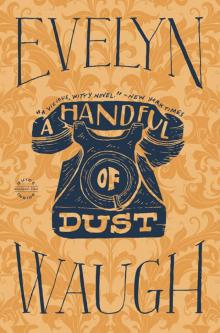 A Handful of Dust
A Handful of Dust Complete Stories of Eveyln
Complete Stories of Eveyln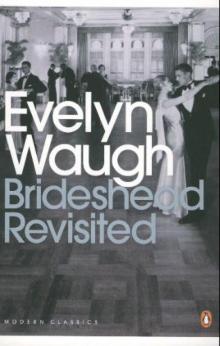 Brideshead Revisited
Brideshead Revisited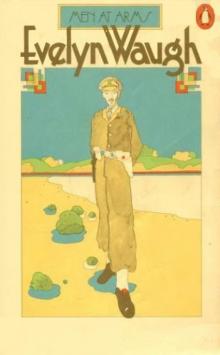 Men at Arms
Men at Arms Black Mischief
Black Mischief When the Going Was Good
When the Going Was Good Officers and Gentlemen
Officers and Gentlemen Helena
Helena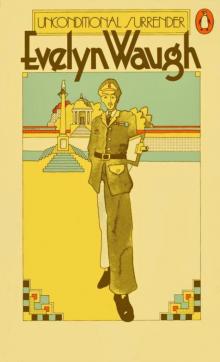 Unconditional Surrender
Unconditional Surrender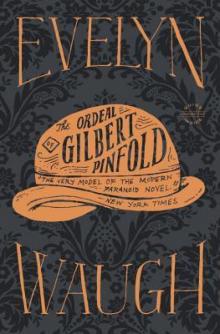 The Ordeal of Gilbert Pinfold
The Ordeal of Gilbert Pinfold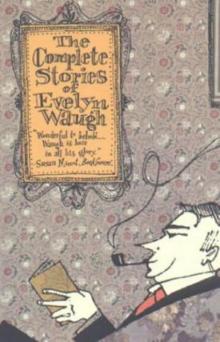 The Complete Stories Of Evelyn Waugh
The Complete Stories Of Evelyn Waugh